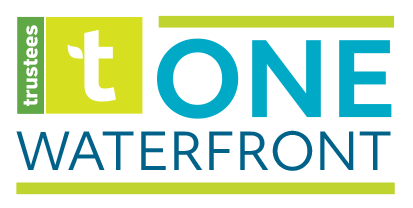The Trustees joins BSLA conference for discussion on open space, community engagement and a more resilient Boston
A gathering to celebrate and discuss parks, greenways, streetscapes, living shorelines and resilient communities was convened by the Boston Society of Landscape Architects (BSLA) on Wednesday.
May 22 BSLA Panel
The Trustees’ Boston Waterfront Initiative Managing Director Nick Black was among the panelists, for a discussion moderated by Ted Landsmark, director of the Kitty and Michael Dukakis Center for Urban and Regional Policy at Northeastern University, and former CEO of the Boston Architectural College. Black joined representatives from Homeowner’s Rehab, Inc. (HRI), the City of Boston, the American City Coalition, GreenRoots, and the Boston Planning & Development Agency (BPDA) on the panel, which centered around how to best engage diverse communities in developing resilient environmental designs.
“We’re really looking to build world-class open space that is designed to attract people from all over, not only different quarters of the city, but from different quarters of the region and the world,” said Black. “To do that we also want to meet the city’s resilience goals, and make sure the open space can be accessible and equitable—both in its design and development.”
With a 128-year-old legacy of statewide land conservation and stewardship, The Trustees has been working to explore opportunities for collaboration with the City and other corporate and nonprofit partners to address the challenges facing Boston’s vulnerable waterfront through its One Waterfront Initiative. The Initiative is a bold vision for creating iconic, public open space on the Boston waterfront that is resilient and accessible.
“We’re looking to reinterpret and create a place using some of the old infrastructure no longer in use,” described Black. “The key question is—how do we do that for everybody?”
One of the ways the Trustees has begun to answer this question is by studying examples of innovative open space projects that have successfully prioritized resilience with equity and accessibility. This includes the High Line Network, a group of “infrastructure reuse projects,” whose teams strive to create equitable public space that bring social, environmental and economic benefits to their surrounding communities. Its 19 member projects currently include the 11th Street Bridge Park in Washington, D.C., The Atlanta Beltline in Georgia, The High Line in New York City, Waterfront Seattle in Washington State, Rail Park in Philadelphia, and Crissy Field in San Francisco.
“A question that often isn’t asked [during infrastructure projects] is, how does it benefit the city socially?” noted Black. “But we know in order to be successful, we have to set goals that focus on important social priorities such as workforce development, cultural enrichment, and cultural elevation, and identify what metrics we will use to meet those goals—and measure their impacts.”
Other panelists shared perspectives on engaging diverse communities and stakeholders, in the midst of fundamental change in the city. “Really thinking about social capital is such an important part of resilience,” said Joe Christo, Senior Resilience and Waterfront Planner for the BPDA.
As The Trustees’ One Waterfront Initiative progresses, we will continue to learn from successful models and look for additional ways to involve the community in the process to ensure the parks and programs are designed to fit community needs. This includes working with many dynamic, diverse neighborhoods alongside our local partners and using surveys, meetings, and data to inform our design and planning process.
The Trustees looks forward to drawing on over a century of expertise in public open space management to deliver new signature, equitable, and accessible destinations along Boston’s waterfront for all to enjoy. A world-class city needs more world-class parks designed for people and protection.
###
The BSLA 2019 conference was hosted at Northeastern University’s School of Architecture, and co-sponsored by the Dukakis Center for Urban and Regional Policy. To learn more visit bslanow.org/event/2019-bsla-conference/

